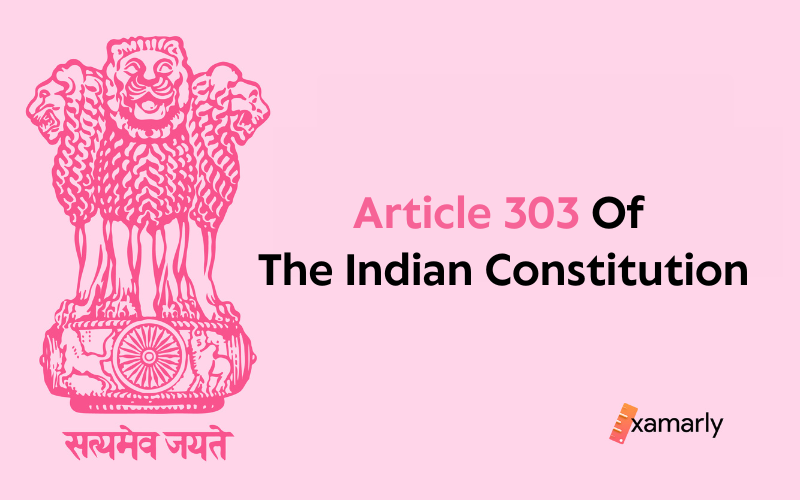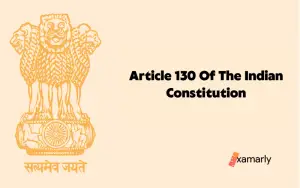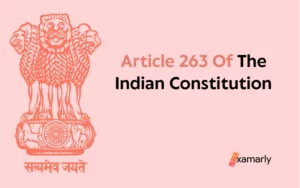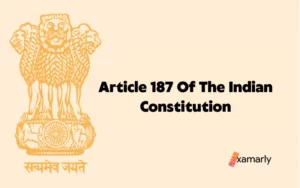Article 303 of the Indian Constitution pertains to the power of the Union (central government) to regulate interstate trade and commerce.
It states that the Union may, by law, regulate or prohibit the trade and commerce between one state and another, or within any part of the territory of India, if it is necessary to do so in the public interest.
The power to regulate interstate trade and commerce is a key economic power of the Union and is an important tool for the government to promote economic development and ensure fair competition between states.
Article 303 of the Indian Constitution allows the Union to take a range of measures to regulate interstate trade and commerce, including setting rules and standards for the movement of goods and services between states, establishing trade agreements with other countries, and enforcing competition and anti-trust laws.
It is an important provision that helps to ensure that the various states of India are able to trade and do business with each other in a fair and open manner.
Let us dig deep into Article 303 of the Indian Constitution to have a better understanding of what is being said and done.
- Article 303 Of The Indian Constitution – In Detail
- Summing Up
- FAQs On Article 303 Of The Indian Constitution
- What is the scope of parliament's power over inter-state trade in India?
- Can states impose taxes on inter-state trade?
- Can parliament discriminate between states in regulating inter-state trade?
- Can states regulate inter-state trade within their own borders?
- Can states impose restrictions on inter-state trade?
Article 303 Of The Indian Constitution – In Detail
We will break down each and every clause present in order to have an in-depth understanding of all the clauses.
Clause 1 – As it is & Explained
(1) Notwithstanding anything in Article 302, neither Parliament nor the Legislature of a State shall have power to make any law giving, or authorising the giving of, any preference to one State over another, or making, or authorising the making of, any discrimination between one State and another, by virtue of any entry relating to trade and commerce in any of the Lists in the Seventh Schedule
The first clause of Article 303 of the Indian Constitution says that Parliament or a state legislature shall not have the authority to enact any law that gives or authorizes the giving of any preference to any one state over any other state or that makes or authorizes any discrimination between any two states in trade and commerce by virtue of any entry in any of the lists in the seventh schedule.
It also says that the above-mentioned clause will be applicable despite anything mentioned in Article 303 of the Indian Constitution.
Clause 2 – As it is & Explained
(2) Nothing in clause ( 1 ) shall prevent Parliament from making any law giving, or authorising the giving of, any preference or making, or authorising the making of, any discrimination if it is declared by such law that it is necessary to do so for the purpose of dealing with a situation arising from scarcity of goods in any part of the territory of India
According to the second clause of Article 303 of the Indian Constitution, nothing in clause (1) shall prevent Parliament from passing a law declaring that it is necessary to give or authorize the giving of, any preference, or make, or authorise the making of, any discrimination if it is declared by such a law that it is necessary to do so for the purpose of dealing with a situation arising from scarcity of goods in any part of the territory of India.
Summing Up
We can conclude from Article 303 of the Indian Constitution that this is a provision in the Indian Constitution that prohibits the Parliament or state legislatures from making any law that gives preference to one state over another or discriminates between states, in relation to trade and commerce.
However, we can also conclude that the provision allows for the possibility of such laws being made if they are necessary to address a scarcity of goods in any part of India.
FAQs On Article 303 Of The Indian Constitution
Here are some frequently asked questions about Article 303 Of The Indian Constitution
What is the scope of parliament’s power over inter-state trade in India?
Parliament has the power to regulate inter-state trade and commerce. This includes the power to impose taxes on inter-state trade and commerce and to regulate the movement of goods between states.
Can states impose taxes on inter-state trade?
No, states are not permitted to impose taxes on inter-state trade.
Can parliament discriminate between states in regulating inter-state trade?
No, according to Article 303 of the Indian Constitution, the parliament is not allowed to make any law that gives preference to one state over another or discriminates between states, in relation to trade and commerce. However, the parliament may make such a law if it is necessary to address a situation arising from scarcity of goods in any part of India.
Can states regulate inter-state trade within their own borders?
States do not have the power to regulate inter-state trade within their own borders. This power is reserved for parliament under Article 301. However, states may regulate the sale and distribution of goods within their own borders, as long as they do not discriminate against goods from other states.
Can states impose restrictions on inter-state trade?
States are not permitted to impose restrictions on inter-state trade. This power is reserved for parliament under Article 301. But states can put reasonable limits on how goods can move within their borders to protect public order, morality, and health, as long as these limits don’t favour goods from one state over those from another.






